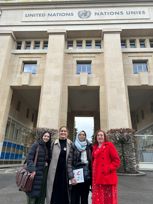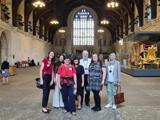Our work
The International Covenant on Civil and Political Rights
In February 2024, the United Nations Human Rights Committee reviewed how well the United Kingdom is meeting its obligations under the International Covenant on Civil and Political Rights (ICCPR).
BIHR submitted a report to the Committee in February 2024 and was kindly funded by the Equality & Human Rights Commission to give evidence in-person alongside two Lived Experience Experts from our RITES Committee.
What is the ICCPR?
The International Covenant on Civil and Political Rights (ICCPR) is a United Nations treaty that the UK has ratified (meaning it is legally binding on the UK). However, as it is not part of domestic law, people can’t bring a court case against the UK if the rights within it are not being upheld. The UK has also not signed the Optional Protocol which would allow people to bring a complaint to the United Nations Human Rights Committee.
The Committee does still monitor how well states are meeting their obligations under ICCPR. This is one of the main ways of holding the UK Government accountable. Every state signed up to ICCPR is reviewed by the Committee roughly every eight years.
How is the ICCPR related to the Human Rights Act?
The Human Rights Act (HRA) gives domestic effect and protection of many of the rights contained within ICCPR. This is particularly important because people can bring court cases under the HRA, which they can’t do under ICCPR.
Some of the mutual rights include: the right to freedom from inhuman or degrading treatment (Article 3, HRA/Article 7, ICCPR); to be free from slavery (Article 4, HRA/Article 8, ICCPR); to liberty (Article 5, HRA/Article 9, ICCPR); to a fair trial (Article 6, HRA/Article 14, ICCPR); to privacy (Article 8, HRA/Article 17, ICCPR); to freedom of thought, conscience and religion (Article 9, HRA/Article 18, ICCPR); to freedom of expression (Article 10, HRA/Article 19, ICCPR); to peaceful assembly and association (Article 11, HRA/Article 21 and 22, ICCPR); and to free elections (Article 3, Protocol 1, HRA/Article 25, ICCPR).
BIHR's submission to the Committee
We submitted evidence Committee focusing on two key points that the UK Government mentioned in its report:
- Reform of the Human Rights Act; and
- Raising awareness of human rights
We said the Committee should make two recommendations to the UK Government:
- The UK Government must commit to protecting human rights for everyone in the UK in a real and practical way by both ensuring they can access their rights through Section 3 of the HRA and ensuring adherence to our international obligations, including respecting interim measures.
- The UK Government must implement a programme of mandatory human rights training for public body workers together with awareness-raising campaigns for the general public. The Government must lead by example, making it clear that the UK places great importance on adherence to the rule of law and on informed, considered, and transparent law-making.
Giving evidence in-person
In March 2024, the Committee met in Geneva and heard evidence from the UK Government, National Human Rights Institutions and non-governmental organisations.
BIHR was kindly funded by the Equality and Human Rights Commission to attend the session. RITES Committee members Kirsten and Fairuz spoke directly to the Committee to share their experiences of human rights in action.
Kirsten talked about her experience as a mother of an autistic son who, from the ages of 14-18, was held in mental health hospitals and subjected to restrictive practices, including mechanical restraint and long periods in seclusion. She shared the impact that staff's lack of understanding of her and her son's human rights had on their lives.
Fairuz talked about her experience supporting women with multiple disadvantages and the need to make human rights accessible and inclusive for everyone in the UK. She shared stories of women who have been forced into dangerous situations because of a lack of support and human rights protections.
Kirsten, Fairuz and BIHR staff then joined the Committee for an informal briefing session in which we were able to answer questions about the human rights situation in the UK. BIHR raised the need for more widespread education on human rights, particularly for the public body staff that have a legal duty to uphold all our rights, such as doctors, social workers and teachers.
What happened next?
After meeting with charities and non-governmental organisations from the UK, the United Nations Human Rights Committee met with the UK Government to ask them questions about how human rights are being protected in the UK. You can watch these sessions on the UN TV website.
On Thursday 28th March, the United Nations Human Rights Committee published its concluding observations from the session, which includes recommendations for the UK Government.
In its observations, the Committee said, "while welcoming the decision to abandon the reform of the Human Rights Act 1998 through the Bill of Rights Bill, which was highly criticized for being more restrictive, the Committee is concerned that similar efforts have been pursued through other legislation." It recommended that the UK Government review its laws to identify any gaps or conflicts with human rights and ensure that any future laws that amend the Human Rights Act do so in a way that strengthens human rights.
Related information
Find out more about human rights in the UK.
Stay up-to-date
Get our newsletter
Get monthly updates on UK human rights law and our work, resources and events sent straight to your inbox.




